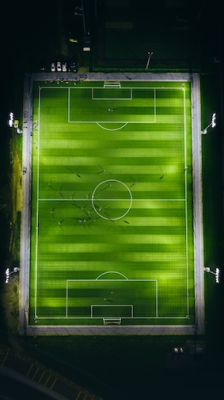Fears for migrant workers as Saudi Arabia chosen to host World Cup

Photo by Izuddin Helmi Adnan on Unsplash
Source: CAFOD
Saudi Arabia has been named as host of the 2034 football World Cup - the second Gulf state to be awarded the quadrennial honour, surpassed only by the Olympics in size. But behind the fanfare and out of sight of most of the fans, the country - with documented concerns around the world over its human rights - will rely heavily on migrant workers to get the job done.
Just last weekend Keir Starmer called for closer ties with Saudi Arabia to bring trade benefits to the UK. But the questions for the British government and the global footballing community are these: what does 'sharing best practice' look like with Saudi Arabia over the next nine years? And what price the lives and rights of the most vulnerable within Saudi society.
According to Human Rights Watch, migrants made up more than 80 per cent of Saudi Arabia's private workforce in 2022 - over 6.3 million workers, mostly in construction, retail and domestic jobs. Since 2019, around one in three came from Bangladesh, with nearly half a million - mostly men - recruited last year alone. The money they send home is vital to Bangladesh's economy. But many who travel to Saudi Arabia return home bruised and broken by the experience; their dreams of lifting their families out of poverty shattered.
Sariful, 20, the eldest of five, was studying at college in Bangladesh but his family could no longer afford the fees. He met a recruiting agent who promised him wages of £350 a month in Saudi Arabia.
"I was desperate to earn money for my family," says Sariful, "so I accepted his offer. He asked for 500,000 taka [about £3,300]. My family took loans from money lenders and relatives to pay him."
Unscrupulous recruiters from countries like Bangladesh often send victims to Saudi Arabia without a work permit. When Sariful arrived in Jeddah there was no job. Instead, he found himself confined, tortured and abused with little to eat or drink. It was two years before he was able to make contact with his family, when the recruiter pressured them for an additional £450 to 'find Sariful a job'. "My family borrowed more money, but nothing changed. I was still locked up and beaten."
Eventually he escaped and found work at a construction site, but tragedy struck when ten days into the job he broke his elbow in an accident on site. The employer offered no support, and his mother borrowed yet more money to bring her oldest son back to Bangladesh.
"I returned home broken, both physically and emotionally," says Sariful. "I sacrificed my education and future, and became a victim of lies, exploitation and cruelty. My family is now drowning in debt, with no way to repay the 650,000 taka [about £4,300] we borrowed. My arm hasn't properly healed, so I can't work to support them."
Under the 'kafala system' in Saudi, employers could take migrant workers' passports, making it impossible for them to change jobs or return home. The practice has been declared illegal by the Saudi government, but there are limited mechanisms to prosecute offenders, and workers often face physical, mental and sexual abuse, exploitation and withheld wages.
In March 2021 Saudi Arabia introduced reforms to allow some workers to change jobs without employer consent, but enforcement is weak, leaving many trapped in exploitative conditions.
Women domestic workers are particularly isolated. Some are forced into the sex trade on arrival, while others face physical, mental and sexual abuse in their employers' homes. Many are forced to work in several different houses without pay and can be accused of 'absconding' if they leave the house without permission. Those who complain to the police are often handed back to their employers, where they face further punishment.
Habibullah was already a skilled construction worker when he sold his wife's jewellery and mortgaged a small piece of land to pay a recruiter. The trafficker promised Habibullah's experience would be 'valuable' in Saudi Arabia.
"My Saudi employer took my passport and made me work 12 to 14 hours daily, often without food or water under the burning sun," he says. "My hands became raw, and I was exhausted."
Fearing the sack, Habibullah continued working even when his wages went unpaid for months: "I felt trapped and helpless. I had no money to return home and couldn't leave the job - or the country - because they held my passport."
Worse was to come for Habibullah, when he was seriously injured at work after falling from the third floor of a part-finished building, fracturing his neck.
"Instead of helping me recover, the company washed their hands of me. They sent me back to Bangladesh, broken and penniless," he says. "Now I lie in bed, unable to move, unable to work. We can't pay back the debt, and my family has been struggling to survive. My children have dropped out of school and my wife works as a day labourer to feed me, my children and my parents. I didn't receive any compensation or justice for what happened to me."
Since 2016 CAFOD has supported a Bangladeshi organisation, OKUP, which promotes safe migration and works to end labour trafficking, forced labour and modern slavery.
While there's no official data on migrant workers being abused and exploited, OKUP estimates that nearly 3,500 Bangladeshis became stranded in Saudi Arabia between 2022 and 2023, without a work permit or a job.
This is the backdrop to the World Cup announcement, and to Keir Starmer's 'free trade' hopes. Both are worthy of further scrutiny, and serious issues must be addressed before anyone declares a 'win' - or this week's celebrations risk being ruled offside.
Shakirul Islam is a researcher and migrant activist in Bangladesh who has been campaigning for migrants' rights for over 20 years. He is the founding chairperson of Ovibashi Karmi Unnayan Program (OKUP), a grassroots migrants' organisation working to raise the voices of migrant workers, their families and their communities at all levels, to ensure rights, justice and dignity for all. CAFOD has been supporting this work with OKUP since 2016.


















